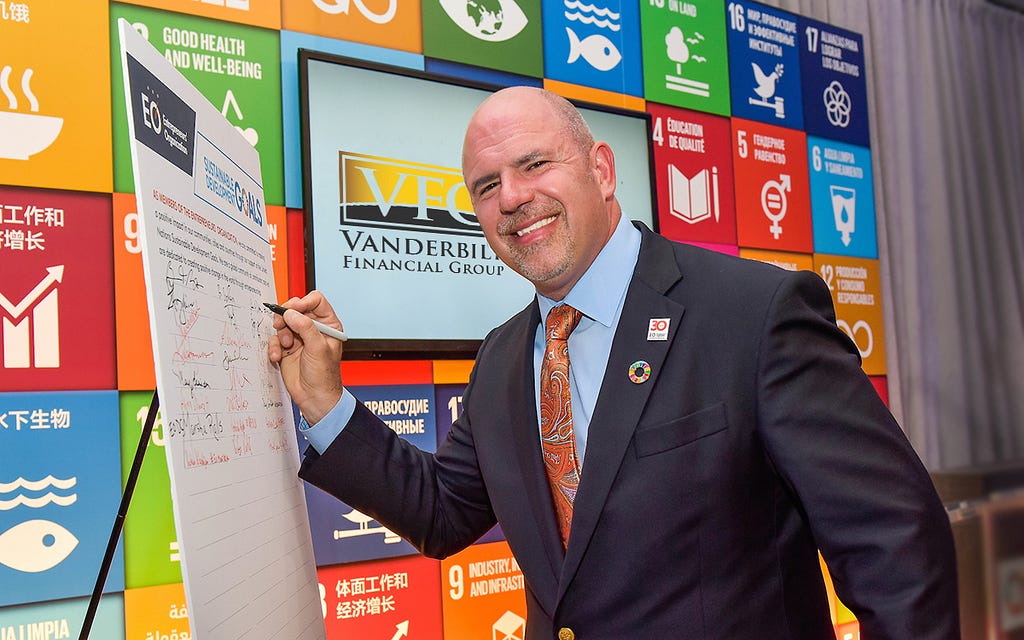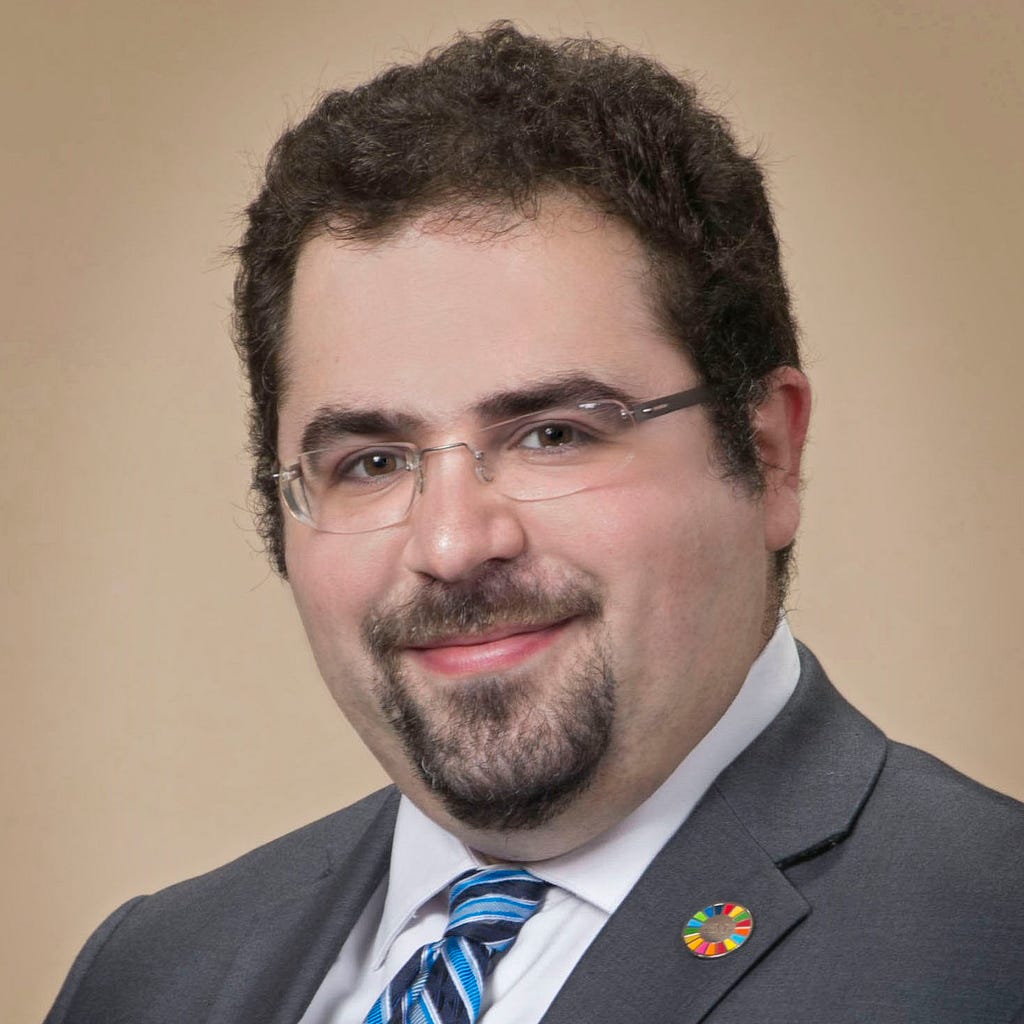B Corp Strategies for a Sustainable Future: ‘Finding Real Solutions to the Problems That Matter’

In the face of large-scale global challenges — from poverty and hunger to social justice and the climate crisis — businesses with an eye toward the future can make small changes and collaborate with other organizations to create collective, effective change.
The 17 Sustainable Development Goals (SDGs) adopted in 2015 by the United Nations member states are a call to action to leave no one behind in the face of global challenges that threaten our planet and societies. The SDGs touch on issues that require companies to rethink their approaches to value generation. In this context, B Lab is working with the UN Global Compact to develop a tool for launch in 2020 to help companies chart their next decade of progress on the SDGs. Learn more about this development here.
In the fourth of a series of insights on the SDGs (find links to previous articles below) and how they can guide and inspire Certified B Corporations and other businesses, B the Change contacted Max Mintz, partner and financial advisor at B Corp Common Interests, and Steve Distante, CEO of Vanderbilt Financial Group. At Common Interests, based in Metuchen, New Jersey, Mintz and business partner Bob Goellner (the founder of the firm) and their office manager Ruth Arriaza provide values-based impact investing and holistic financial planning for clients. Distante and the Vanderbilt Financial Group team based in Woodbury, New York, aim to bring about positive social, environmental, or governmental change through their business and investments.
Distante and Mintz will be part of the Impact Forum, set for December 4–5, 2019, at the United Nations that will include a film festival and impact investing conference. Read on to learn more about how Distante and Mintz support the SDGs through their work and why they encourage other businesses to chart their progress on the SDGs.


Let’s start at the highest level. What do you think is most valuable about the Sustainable Development Goals?
Steve Distante: The SDGs were created collaboratively by 193 governments over a three-year time frame around 2015, addressing some of the world’s toughest challenges and most pertinent problems. The global goals were given an ambitious deadline of 15 years to be addressed and resolved, which speaks to the urgency of many of these issues. The most valuable aspect of the SDGs are that they are not just for global governments or larger corporations to tackle — they also empower citizens, entrepreneurs, leaders, employees and activists to all come together under a common language and intention with the backdrop of the UN. It is truly an inclusive movement from formation through implementation.
The most valuable aspect of the SDGs are that they are not just for global governments or larger corporations to tackle — they also empower citizens, entrepreneurs, leaders, employees and activists to all come together under a common language and intention with the backdrop of the UN. It is truly an inclusive movement from formation through implementation.
Max Mintz: To me, the most valuable part of the SDGs is that they give us a visual language to discuss the issues facing society and the planet. Too often, I’ve seen people become overwhelmed by the scope of these issues and either fall into despair or inaction. The SDGs allow people to identify the issues that they want to focus on so that they can take action in a way that is meaningful to them. The SDGs are a positive, uplifting message built to inspire, not cause people to get depressed.
Is your business looking for ideas on making a positive environmental impact? Check this free online report from B Lab that compiles articles and resources to help your business become a climate leader. Whether you work at a large company or an agency, get inspired to do more today.
2030 is only a decade away. Where do you think action needs to focus in order to get there?
SD: I think we need to create more awareness of the SDGs in general. One project I’m working on is to use storytelling as a medium to educate, inspire and celebrate entrepreneurs who are using the SDGs in their businesses. I recently released my second film, Igniting Impact, which shares the stories of eight entrepreneurs doing just that.
It’s important we begin focusing our businesses on the benefits of aligning purpose with profit and engage leaders in meaningful ways using the SDGs as a framework for doing so. Becoming a B Corp is definitely a step in that journey, but also focusing on one or more of the SDGs (as they are very interdependent) elevates businesses to exist in service of finding real solutions to the problems that matter.
MM: The power of the SDGs is that they allow us to focus our efforts on the issues that matter most to us. As we have met with clients and discussed the SDGs in detail, I’ve found that every time I bring them up, a different SDG speaks to each client. If we each work on the issues that matter most to us, together we can accomplish great things! I’m reminded of a saying we have around the office: Do what you do best, and pay for all the rest. To me, this means that we should each be working on those issues that speak to us, that inform our passions, where we can do the most to move the needle on these issues.
The SDGs have been called the closest thing to a sustainability strategy for humanity. Do you think this strategy has enabled business to meaningfully take action?
SD: For many businesses, yes; however, for others it often takes creativity to align their businesses in a meaningful way. Not every business has sustainability baked into its core, but I believe every business can be sustainable.
A real issue in the strategy of the SDGs is awareness that they exist and that successful entrepreneurs and businesses are already utilizing their framework to infuse meaning and purpose in their business. Those of us working in the space need to share our story and spread the word to companies and entrepreneurs to show that this purpose can also be profitable. This is one of the main drivers for my creating a documentary film. I want entrepreneurs, leaders and students to see a range of businesses that are working on a wide spectrum of issues while also achieving economic success.
MM: Absolutely! The SDGs provide a framework to understand how we can move toward a more sustainable future. The SDGs are global and must be understood through a regional lens. Great strides have already been taken to galvanize companies to take action, most prominently in Europe, where the EU has launched its Taxonomy for Sustainable Activities, which provides a roadmap to achieving the SDG targets that the EU has identified as critical — namely climate action, sustainable natural resource management, and good work and economic growth, all of which are supported by and aligned with their sustainable finance initiative. In the US, we’re far behind this regulatory framework, but the impact of the EU’s actions, as the world’s second-largest economy, will be felt globally.
Can you give us an example of a business that gives you hope that we will achieve the Sustainable Development Goals?
SD: We cover a wide range of examples in the film, but two that are top of mind are John’s Crazy Socks and World Tree.
John’s Crazy Socks is a great example of two SDGs intersecting in one business: SDG 8, Decent Work and Economic Growth, and SDG 10, Reduced Inequalities. In providing meaningful job opportunities to people of differing abilities, John’s Crazy Socks taps into an underemployed and often underpaid workforce. John’s Crazy Socks gives us the playbook.
World Tree directly correlates with SDG 13, Climate Action. They use a for-profit business structure to benefit both farmers and investors while using the regenerative power of the Empress Splendor tree to have dramatic effects on our fight against land and air degradation: It reduces carbon 11 times more than any other tree, reinvigorates even the most decimated soil, and is one of the fastest-growing trees in the world. Not to mention, World Tree is a heart-centered, female-founded and female-operated business fighting for gender equality and representation.
MM: One of our most exciting projects this year was our first private impact investment in a company called TerraCycle, an innovative recycling company that is committed to eliminating waste through materials science and upcycling. Discussing this business with our clients has inspired many of them and given them hope that businesses are in fact working to create a more sustainable economy.
How will the online platform that B Lab is developing alongside the UN Global Compact serve the 2030 agenda?
SD: From my understanding, the online platform will begin to quantify the effectiveness of B Corps in an SDG matrix. It’s been a struggle to quantify the impact the SDGs have had inside of businesses. We desperately need tools like this to help make the business case for the SDGs and show the impact we’re having in the world to all our stakeholders.
MM: As a Certified B Corp, our firm has used the existing B Impact Assessment as a roadmap to improve the sustainability of our firm, and we’ve made huge strides! This platform will give us and others the next step: tools to align our mission with the SDGs and report back to our stakeholders. We don’t have the infrastructure to develop this kind of platform on our own, so we rely on B Lab to provide these kinds of tools.
Which SDG is top of mind for you right now, and why?
SD: SDG 17: Partnerships. The SDGs are incredibly interconnected between issues and the stakeholders of people working on them. Entrepreneurs and companies offer solutions; investors drive capital toward those solutions. We need to harness the power of collective action and work together with others to multiply our effect on the SDGs.
MM: I’m in an interesting position: as a fiduciary, I’m obligated to put my clients’ interests ahead of my own, so my work on the SDGs is motivated by my clients’ wishes rather than my own. In our recent impact report, we conducted a survey of our clients to understand how they prioritize the SDGs, and we’re driven by that data.
Interestingly, our clients’ priorities fall into the areas of basic needs: Clean Water (SDG 6), Zero Hunger (SDG 2), and Quality Education (SDG 4) topped the list, while Gender Equality (SDG 5), Good Health (SDG 3), and Climate Action (SDG 13) were close behind. We’re actively searching for investments that work to achieve these goals.
Other articles in the SDG series:
- How the SDGs Help Businesses Effectively Measure and Collaborate to Address the Climate Crisis
- Ethical Fashion Accessories That Incorporate the Sustainable Development Goals
- All About the Sustainable Development Goals: Get Up-to-Speed on Agenda 2030
B the Change gathers and shares the voices from within the movement of people using business as a force for good and the community of Certified B Corporations. The opinions expressed do not necessarily reflect those of the nonprofit B Lab.

How the Sustainable Development Goals Provide a Framework for Impact-Minded Businesses was originally published in B the Change on Medium, where people are continuing the conversation by highlighting and responding to this story.